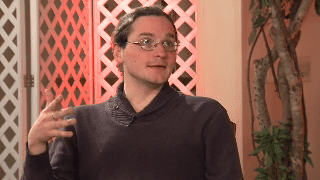Over Easter this year my friend Joshua Gonnerman found out that he lost his job because of his sexual orientation. Firings of LGBTQ people from Catholic institutions are unfortunately common, but in most of the well-publicized cases people have been fired because they violated ethics codes which (at least in theory) apply to both gay and straight Catholics. Those who argue in favour of such firings say that by openly engaging in homosexual relationships people who work for the Church or teach in Catholic institutions are undermining the Catholic identity of their employers.
The thing is, Gonnerman is celibate. Publicly so. His sexuality came to the attention of his employers because he was featured in a Washington Post article talking about the gay celibacy movement in conservative churches. Not only does Josh accept the Church’s teaching, he has also been publicly involved in helping others to find life-giving ways of living that teaching out.
The issue here is not sexual behaviour, but orientation.
I wish I could say that this is the first time that one of my friends has lost work at a Catholic or Christian organization because of their sexual orientation, but it’s not. No amount of public fidelity to the traditional teaching on marriage, nor even the use of terminology like “same-sex attracted” instead of “gay,” has been sufficient to prevent discrimination within conservative Christian institutions. In most of the cases that I know of, people were fired, denied employment or dismissed from positions within their churches (including areas of ministry that have nothing to do with sexuality) because they decided to publicly discuss their sexuality in order to defend the teaching. In almost all of these cases, they were told directly that their homosexuality was the cause of concern.
This is why it makes my blood boil when people claim that there is no homophobic discrimination in Christian circles — that Christians discriminate between sinful and unsinful behaviours, not people. I know a lot more queer/SSA Christians than most folks do, and the rate at which I see blatant discrimination against my friends is high enough that nobody will ever be able to convince me that this is a rare or freakish occurrence: the work of occasional, isolated individuals rather than a symptom of systemic prejudice.
Now, I know that someone is going to stand up in the combox at this point and say “Well, why do these people have to be open about their sexual desires? I don’t run around telling people that I’m privately attracted to bikini-clad wombats — and if I did, I wouldn’t be surprised if people reacted negatively.” The argument here is basically an argument for gay erasure: people with same-sex attractions should faithfully embrace the traditional teaching, but they should do so silently. Perhaps they can share their struggle with their confessor, or with a few close friends, but nobody else should ever know about it.
The problem with this approach is that it essentially prevents LGBTQ Christians from being able to find role-models, and it hamstrings Christian witness to the LGBTQ community. It’s very common for gays and lesbians who are trying to live chaste lives to feel as if they are alone, trying to blaze a trail through a hostile cultural jungle while people snipe at them from both sides. Leadership, community and public witness are essential in making the Church’s teaching a viable option for people.
LGBTQ Christians who are open about their orientation are also able to provide necessary feedback to Church leaders and people in ministry. Consultation is a tremendously important part of the Church’s pastoral practice precisely because it allows doctrine to be promulgated in ways that are practicable. If someone simply tells you to do something, and the thing that you have been told to do seems impossible, you’re very unlikely to succeed unless you are able to describe the difficulties that you’re having and receive further, more helpful guidance. If gay and lesbian Christians are discouraged from even identifying themselves to their communities, what are the chances that we will be able to have fruitful conversations about the difficulties that queer people encounter when trying to live out their faith?
For LGBTQ Catholics, the message is already abundantly clear. There are plenty of institutions that happily employ divorced and remarried Catholics, Catholics who openly dissent from the teaching on birth control, and Catholics who publicly teach an economic doctrine contrary to the Church’s social teaching — but that feel the need to invoke “ethics codes” and “fidelity to the Church” only when it comes to gay or lesbian employees.
But what has happened to Josh, and to others, goes beyond this simple double-standard, discriminating not only against those who choose to reject the teaching but also against those who accept and practice it. It raises the standard for queer folks high above anything that is expected of their straight colleagues, and it communicates to LGBTQ Christians that we are seen as dangerous outsiders even if we choose obedience to the teaching of the Church.
Please consider supporting Josh at his GoFundMe page.
Image of Joshua Gonnerman used with permission.
Please note: I’m currently pretty under the weather, and I don’t have the energy to police the combox. Personal attacks on Josh, including aspersions cast on his fidelity to the Church and complaints that he’s a traitor to queerdom, will be exterminated. If the combox gets ugly, I will just shut it down. Feel free to discuss, but do so respectfully and intelligently.













